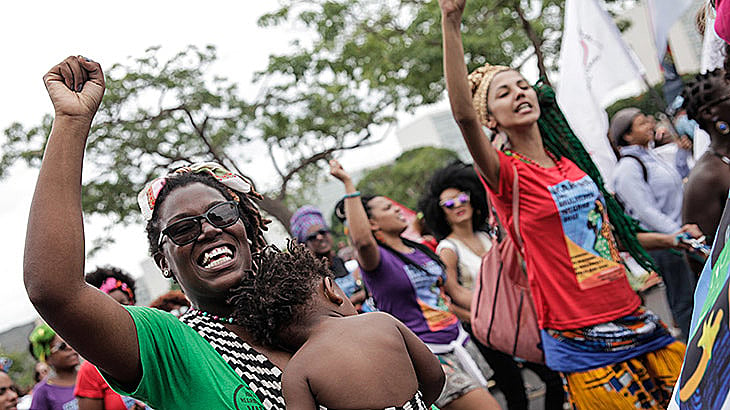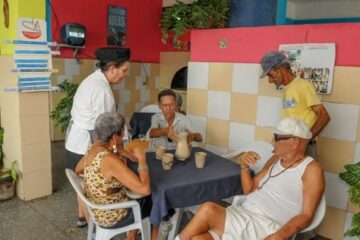After decades of organization, mobilization, and struggle, and the recent experience of the COVID-19 pandemic, care today has arguably been included in the public agenda in different parts of the world. There are different—even antagonistic—horizons and perspectives mobilized around that same agenda. The experiences of feminist movement-thought help us understand the battles around care.
This is a synthesis of the seminar “Socialize Care Work: Feminist Experiences and Struggles,” held online on June 4th, 2024 with the panelists Amanda Verrone, of the LAB Union of the Basque Country; Cecília Kitombe, of Angola’s Ondjango Feminista; Dory Capera, of the Trade Union Confederation of the Americas; Magdalena León, of the Network Women Transforming the Economy (Red Latinoamericana de Mujeres Transformando la Economia—REMTE), from Ecuador; and Yessica Restrepo, of Colombia’s Confluence of Women.
Starting Points
The perspective that guides us considers care as labor, practice, and relations that shape the sustainability of life. This is an understanding that is not restricted to the direct act of caring for one person, but involves a whole set of conditions for the possibility of life—that is, people, food, seeds, common goods, and the different forms of economic relations that are beyond what is traded in the market. We situate care in the relationships of interdependence, affirming autonomy and self-determination as principles. We also consider care as part of ecodependence, beyond human life.
As the Network Women Transforming the Economy (REMTE) shared, care is an economic and comprehensive experience for women. It is feminized and racialized labor that is carried out in different contexts, spaces, and circumstances, pervaded by contradictions. While it can mobilize and create ethical principles for shared life (including solidarity and reciprocity), the shouldering of the responsibility for care is immersed in relationships of gender, race, and class oppression. Right upfront, a challenge is to reclaim this experience as a catalyst of structural changes in the ways of (re)producing shared life.
What is now called care has deep roots in what socialist feminism has formulated for decades in terms of reproduction, and which feminist economy has systematized as the advocacy of the sustainability of life. This perspective is also connected to the expansion of the notion of the capital-labor conflict to the notion of the capital-life conflict, exposing that the logic of capital accumulation is not compatible with the logic of care and the maintenance of life.
Care on the agenda through movement building
There are many strategies and tools to put care at the center of the political agenda. In Angola, for example, Ondjango Feminista has organized a survey with women to introduce this topic in society. The group took to squares, markets, and schools to talk to women about how they use their time. With a higher fertility rate than the world average (5.3 in Angola, while the world average is 2.2), women said that child rearing is among the responsibilities that most overwhelm them in their everyday lives. They concluded that, even without a care policy, there is effectively a care system supported by women’s unpaid work.
In Latin America, care was at the center of women’s responses to the offensives of neoliberalism against the privatization of public education and health care services, for example. The memory and relevance of these struggles today are a point of reference to distrust what organizations like the International Monetary Fund (IMF) propose around care. The IMF’s impositions on the economic policies of indebted countries increase the cost of living and reduce state investments in public services, increasingly relying on the overburdening of women, imposing more unpaid work onto them. The IMF treats women’s greater responsibility for care as an obstacle for their participation in the labor market. Without changing their conditions, it promotes false solutions based on the private sector and on increasingly precarious conditions. It is a perspective for women’s inclusion in this system that does not change the structures of oppression and, therefore, it is not good for the majority of working-class women.
Struggles grounded in local territories for the right to child care and collective spaces for nourishment have been the foundation of the formulations around the right to care—which involves both the rights of who receives and who provides care. This perspective involves a simultaneous movement for the recognition, redistribution, and social and economic appreciation of care work, as reported by the sisters of the Trade Union Confederation of the Americas. This way, we understand that work is not only paid work—which has been fundamental in the struggles for domestic caretakers.
The sexual division of labor, which is always articulated in connection with the racial division of labor, constitutes the material basis of women’s oppression. Not only this division separates men’s work from women’s work—production and reproduction—, it creates hierarchies between them. Whether unpaid or underpaid, domestic and care work and the people who do it—Black and immigrant women—are under-appreciated. When it is paid, this work is carried out in precarious conditions, with no social protection.
The sisters of the LAB Union shared the paths that led to the mobilization of a general strike for the socialization of care in the Basque Country in November 2023. Spearheaded by the feminist movement, it was a building effort that involved different trade union sectors, including workers in the industrial and telecoms sectors. The background of the strike was a process of recomposition of the working class around the union. Care was then included in the agenda of struggles against privatization.
Feminist union activists positioned domestic and care workers’ struggle for living and working conditions as a pillar of the demands, along with the perspective of struggling for the timings of care for the working class at large. These pillars are connected to the struggle for a public-community care system. This was a result of women’s self-organization in a feminist secretariat, of the consolidation of an anti-racist perspective, of alliance building efforts, and a combination of tools for mobilization and political education.
By organizing a general strike with these demands, it became clear that not all women workers have the right to strike, because there are works that simply cannot go undone, as is the case of care work. This was a historical process for the union movement and it effectively reshaped the classic concept of strike, as it expanded the notion of work.
We must advance in the formulation about the concrete reality of care work. A lot of what is understood about care work is mirroring wage labor. There have been advances in terms of redistribution, time, and rights, but little is said about the logics of this work. This can only be discussed by considering women’s experiences, their networks, relationships, and also their technologies. This is necessarily linked with working conditions and possibilities of socialization, articulating public and community dimensions together. A clue that was shared was to reclaim the principles, relationships, and dynamics of care that are at the heart of the sustainability of life—and, therefore of the economy—to change it.
Public policies to reorganize care and put life at the center
There are different experiences underway, especially in Latin America, for building national care policies, as is the case in Brazil. Some of them take the form of national care systems. These building efforts are more likely able to contribute to change the bases of inequality when they are in tune with the redistribution policies of such governments.
The sisters of the Confluence of Women of Colombia shared their current experience. In the country, the state has been supporting the creation of a care system that combines policies dedicated to women and experiences of policies grounded in the territories. The main example is Manzanas de Cuidado, public care facilities that also promote women’s autonomy. They create possibilities for more collective work and the undertaking of tasks that are usually carried out inside the home, like laundry. This allows women to have more time to rest, socialize, and have more autonomy. In a territory affected by years of armed conflicts and paramilitary forces, as well as the advances of transnational mining corporations, women believe in this shared alternative as they understand that community care, both in rural and urban areas, is a work and practice led by women, which requires time and needs for organization.
Effectively, there are the ideal care systems and the actual care systems, where women simultaneously bear the brunt of and spearhead them. Care involves the timings of labor, organization of networks of care, and mobilization of different resources around the care of shared life.
In face of the threshold of survival of humanity and the planet, we must build the conditions to break the logic of accumulation, change reproduction—but also change production (what is produced, how, what for, and for whom?) based on the logic of care and the sustainability of life. There lies the power to change the entire economy based on the logic and the timing of care.

The webinar was organized by SOF—Sempreviva Feminist Organization, the World March of Women Brazil, and Capire, with the support of the Ministry of Women of the Brazilian federal government, with funds from grant No. 954083/2023.




